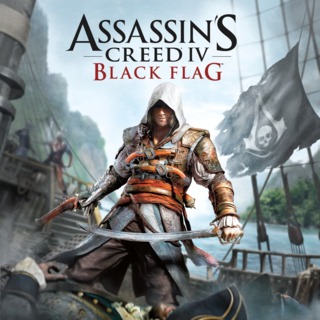AC4 is in some ways a return to the roots, but mostly continues the trend of steering farther and farther off course (get it? naval metaphor!). Let's dive (heh heh) right into it.
The plot is more in line with the original AC games. Edward (the protagonist) learns early on about the existence of a place called the Observatory, a First Civilization installation that allows you to spy on any living person, and finding it becomes his dream (initially, for purely mercantile reasons). This is a much better premise than in AC3 (if that game can even be said to have one), but the execution suffers. Basically, the whole game builds up to Edward reaching the Observatory, but when he does, it's something of a disappointment. It's not as grand a place as one might expect, nor does it hold any important revelations. I expected the final showdown to take place there, and it sort of does, but that is the second time you visit the place, which dilutes the experience; it's like if Ezio had already been to the Vault before confronting Rodrigo Borgia there. The story starts going downhill after your first visit to the Observatory, with a lot of things not making sense. It should be noted here that Edward is not an Assassin and never becomes one, which is strange, considering the name of the game. In the course of the game he crosses paths with the Assassins and gradually comes to understand and accept the Creed, but his initiation, which I expected and was looking forward to, happens off-screen, in the future we don't get to see.
Not that it matters gameplay-wise; you still get to wear Assassin robes and kill Templars. The system of assassination contracts makes a reappearance, and you get to unlock a special suit of armor, just like in AC2 and its add-ons. Unfortunately, the tailing and eavesdropping missions are back, too, and it feels like there are more of them in this game than in AC2 and ACB combined. The combat has taken a turn for the worse. The combat system is the same as in AC3, but it feels less fluid, somehow, and your opponents less solid. It's difficult to describe, but it just feels less realistic than in the last game. Besides, the camera's behavior is simply horrible at times, and sometimes there are so many people fighting (mostly during boarding actions) that it's hard to tell what the hell is going on.
The naval part is OK. Naval combat takes up a large part of the game, but not so large as to become annoying. It can be tough initially, but once you have upgraded your ship, it becomes bearable and sometimes even fun. You can also capture other ships and send them on missions, like you did with your Assassins in Brotherhood and Revelations. It is optional and, thankfully, quite simple, unlike the ridiculously overcomplicated economy system in AC3. There is also a crafting system, but this time it is focused on making things for yourself, like improved armor and equipment, and it is also very simple, which is a definite plus.
The open sea and lush tropical islands make a much better setting than North American wilderness, but still not a proper setting for an AC game. I have always maintained that Assassin's Creed is, first and foremost, an urban adventure, and it is the architecture you encounter in the game that defines the experience. Kingston and Havana, the two principal cities in the game, look nicer than anything in AC3, but are still unimpressive on the whole, and their most prominent features are, by the game's own admission, anachronistic. Basically, they're saying, “Yes, we picked such a time and place that we had to invent stuff just to make it look halfway decent.” Why not choose something that is interesting and beautiful to begin with?
The present-day part of the story also deserves mention. You play as an Abstergo employee, and as such are granted an amusing insight into Ubisoft's workings, because it's clear as day that Abstergo Entertainment is a self-portrait by Ubisoft with some minor changes. You also encounter old acquaintances from the previous games and have a fun little adventure, but it doesn't amount to much in the end. I enjoyed the experience, but it definitely could have been something more.
The multiplayer has seen a lot of changes and additions that would have been welcome about two games ago. Unfortunately, the maps are so garish that looking at them makes your eyes hurt, and the player personas have lost every vestige of individuality, so I will continue playing online in ACB and ACR.
Verdict: decent, better than AC3, still nowhere near as good as anything that came before AC3.
P.S. The game gets bonus points for referencing The Secret Of Monkey Island.

